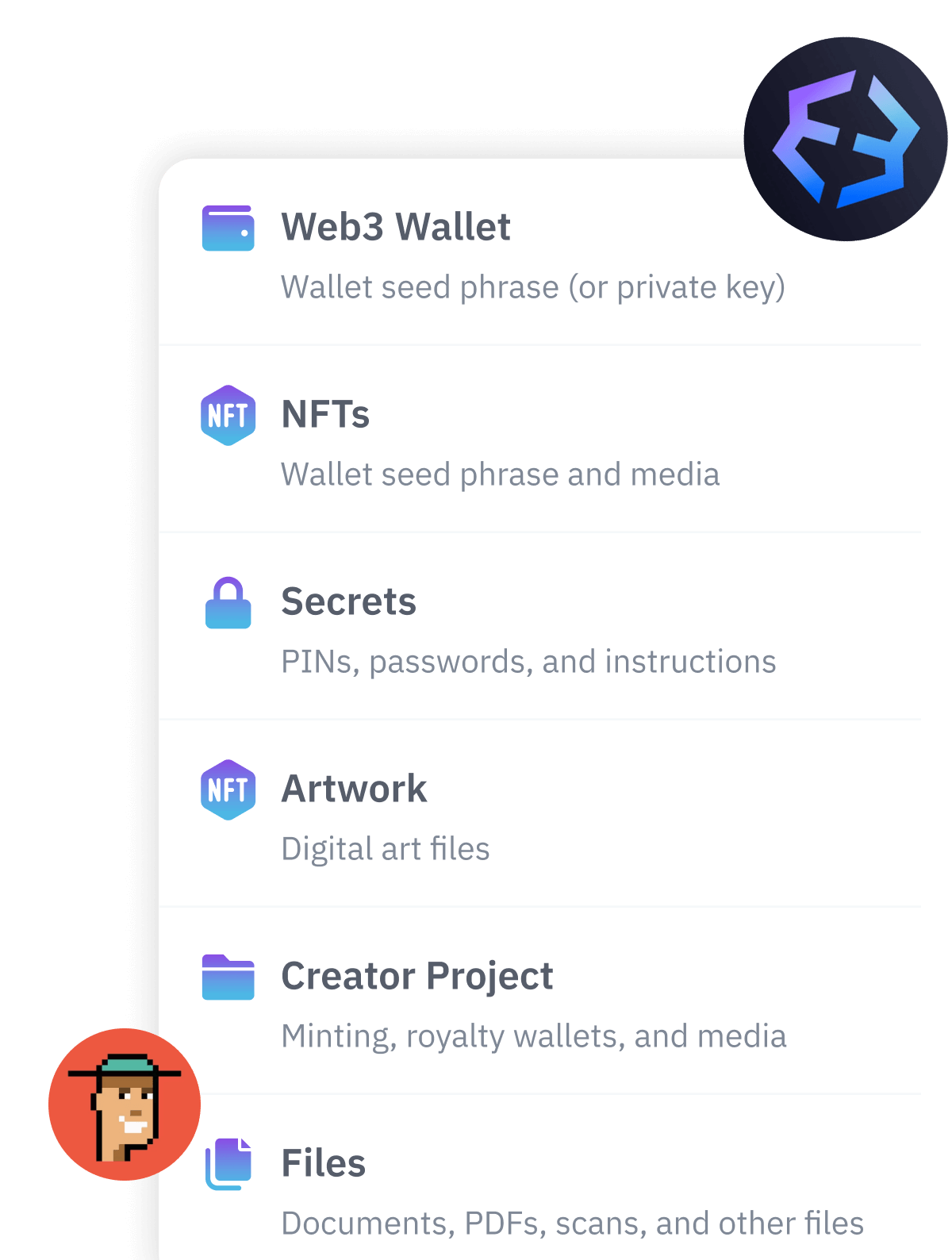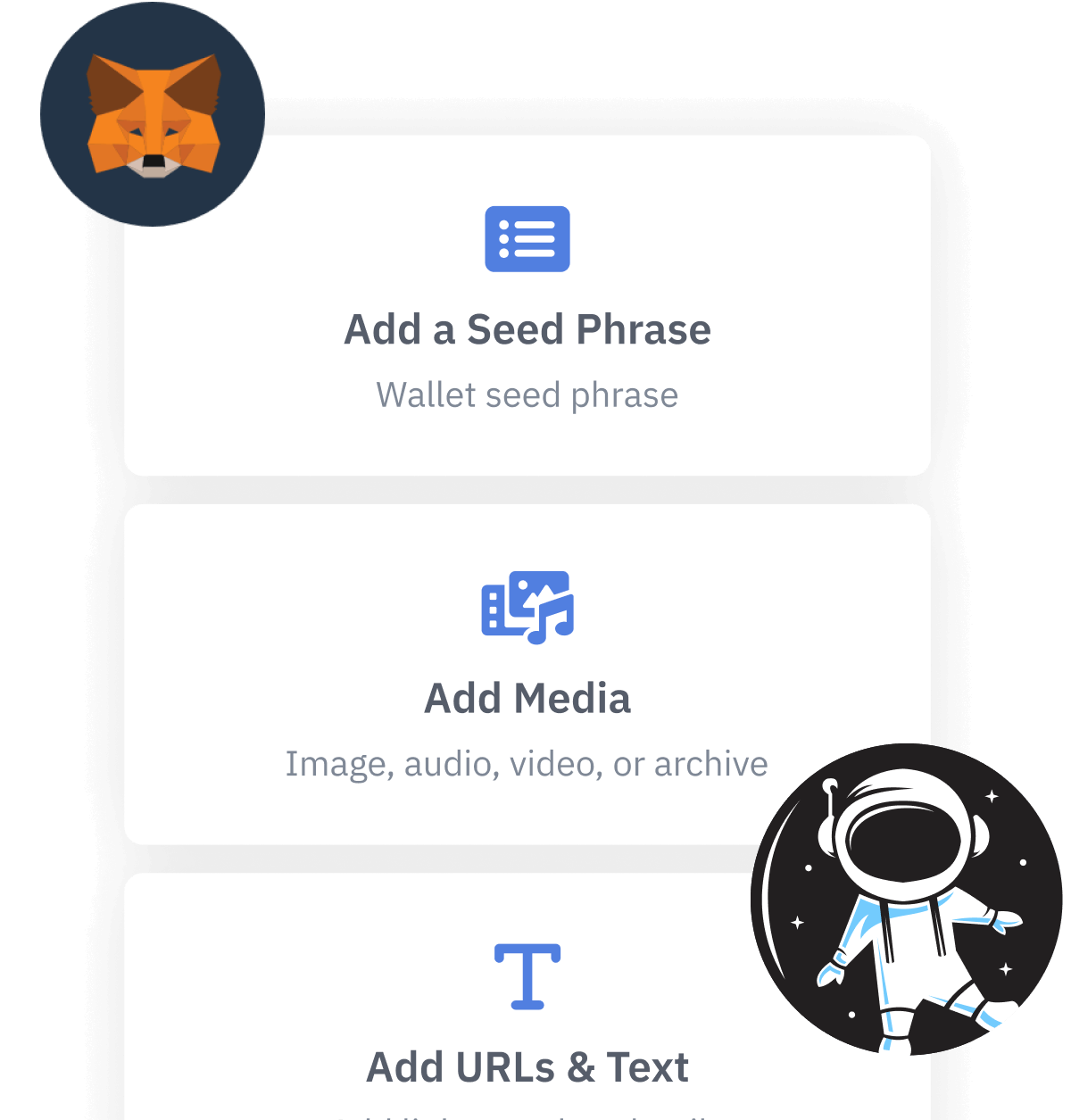
Contents
- What are the advantages of making donations in cryptocurrency?
- What are the tax implications for cryptocurrency donors?
- How can you make crypto donations?
- How can holding on to donated crypto maximize its impact?
- The $5M Bitcoin donation to the Wharton School
- How can you make NFT donations?
- What are some examples of NFT donations?
- What are the tax Implications for NFT donations?
- How can your company donate crypto to a Cryptocurrency Project?
- How can you participate in crypto "Social Giving?"
- Crypto Tax Services from Mike Minihan and BX3
- Crypto Legal Services from Philip Berg and Otterbourg P.C.
- Protecting cryptocurrency and NFTs with Blake Commagere and Wasim Ahmad, Vault12
- DISCLAIMER
How to make Crypto and NFT donations to Nonprofits
Maximize the power of your digital donation.
Summary
Just like that, cryptocurrency and non-fungible token (NFT) digital donations are now the fastest-growing new type of donation to charities around the world. Consider these 2 top points:
1. Over $300M in crypto has been gifted in the last year, and most recipient nonprofits have opted to auto-convert cryptocurrency to dollars or equivalent upon donation.
2. More sophisticated ways to receive crypto gifts, like endowments and trusts, can hold cryptocurrency for future conversion.
This article is for donors - it explains the benefits of making crypto donations, and describes some of the options for more sophisticated and impactful giving.
Two related articles describe other perspectives of crypto donations:
A companion article targeted at nonprofits helps them understand how they can benefit from accepting crypto donations.
An article for U.S. Congressional representatives guides them toward resources that help them to accept crypto donations.
What are the advantages of making donations in cryptocurrency?
Amongst the many reasons for donors to make cryptocurrency donations, three main advantages stand out:
- Cryptocurrency and NFT donations are tax-efficient for both the donor and the charity. Donors pay no capital gains tax, and nonprofits receive 100% of the donation tax-free. Nonprofit charities are exempt from paying capital gains tax when they sell assets, so the full value of the gift stays intact.
- Crypto donations to international nonprofits can be transmitted and tracked more easily.
- Nonprofits have flexibility in how to realize the gift value - they can convert to a currency-based asset type immediately to avoid potential volatility, or they could hold the funds ("HODL") as an investment in the form of an endowment to fully realize its value and impact over time, e.g., the Charity Water Trust.
Tax-efficiency
To illustrate the tax-efficiency of crypto donations, consider this example from Fidelity Charitable that shows a calculation of how much more of a donation is received from donated crypto versus if the donor had converted it to cash first.
- This example assumes that all realized gains are subject to the maximum federal long-term capital gains tax rate of 20% and the Medicare surtax of 3.8%. It also assumes no additional state or local taxes.
- The amount of the proposed donation is the fair market value of the appreciated crypto-asset held more than one year that you are considering donating as determined by a qualified appraisal.
- The tax basis is assumed to be $300,000. If you sold the bitcoin for $1,100,000, you would have $800,000 in capital gains and would pay $190,400 in tax.
Crypto is Fast, Transparent, and Secure
Using traditional methods, a donation transaction is conducted via credit card, ACH, or wire transfer - perhaps even via a cheque. These transactions take days to clear, often incur fees, and are subject to chargebacks if there is a problem with the payment.
Cryptocurrency donations are more efficiently transferred to nonprofits anywhere in the world, usually in less than 10 minutes. Since all crypto transactions are recorded on the Blockchain - a ledger that is publicly accessible - all transactions can be easily tracked and verified by the donor and the nonprofit.
What are the tax implications for cryptocurrency donors?
In the U.S., crypto donors pay no capital gains taxes on donations to 501(c)3 organizations. This is a huge benefit for the donor for an activity that would otherwise trigger a taxable event.
In addition to having no capital gains taxes due, the donation of appreciated crypto creates a tax deduction for the donor equal to the fair market value of the donated crypto asset. A win-win situation.
When you compare the costs of making a donation from crypto assets directly with the costs when using post-tax assets, the donor would be subject to a minimum of 23.8% federal long-term capital gains on post-tax asset donations (and perhaps more at the state level, depending on their state of residence). There are currently no federal capital gains taxes levied on crypto donations.
Other countries, including the UK, have also moved to reduce or eliminate capital gains on cryptocurrency rewards.
Donors should review their taxable transactions in products like TaxBit, to determine not only which types of trades to make but also how much to donate to maximize tax deductions and minimize losses overall.
Additional Resources:
IRS Crypto FAQ
101: Crypto Tax Guide
Crypto Tax Survival Guide
How can you make crypto donations?
There is no universal approach to making a crypto donation. However, many service providers work directly with nonprofits to make sure that it is easy, simple, and safe to make and receive donations. By far the most helpful of these service providers is The Giving Block. (The Giving Block also offers this helpful Crypto Glossary for Nonprofits.)
The first step in giving is finding a nonprofit that can accept cryptocurrency donations. Here are some ways to find one that fits your donor goals:
How can holding on to donated crypto maximize its impact?
So far, we have discussed the scenario where a crypto donation is made by the donor, and the nonprofit auto-converts that donation into cash - as is usual with augmented assets. However, with cryptocurrency and NFTs, there is an opportunity to make a far more lasting impact with the gift - if paired with appropriate safeguards against volatility.
Many charities now accept crypto endowments. For instance, Charity Water set up a trust that receives crypto donations and holds them for the next 5 years. At the end of 5 years, the crypto assets can be sold.
Similarly, the Wharton School has received large bitcoin donations to stimulate more crypto giving. These donations are backed up by the donor to ensure that the school receives a minimum value in case the price of crypto goes down.
Donor-advised funds, Charitable Trusts, and Community Foundations can also receive gifts in bitcoin and ETH - if the nonprofit can accommodate.
- Platforms like NYDIG that focus on endowments and other sophisticated gifts of digital asset donations for universities and charitable institutions.
- Other platforms that are focused on providing donors with tax advantages via Donor Advised Funds (DAFs), including Endaoment a tax-exempt community foundation that helps nonprofits receive their very first crypto grants, Fidelity Charitable, the largest donor-advised fund in the United States, with over $35 billion in assets, and its main competitor, Schwab Charitable, with over $17 billion.
The $5M Bitcoin donation to the Wharton School
"The $5 million bitcoin gift in May was more complex. The donor wanted it to be large enough to attract attention that would help the university get similar donations. At the same time, the donor wanted the money to fund research and programs at the Stevens Center for Innovation in Finance at the Wharton School.The donor wanted the university to hold at least some of the donation in bitcoin, but the issue of what would happen if it plummeted in value had to be resolved.
"Our policy had been to traditionally sell everything immediately, even if it had been $5 million in stock," Mr. Zeller said. "So the donor and the university agreed that he would backstop it. He gave us $5 million in bitcoin. We liquidated some; we're holding some. But he said, 'I guarantee that at the end of the day you'll get $5 million whether it's in bitcoin or something else.'"
Excerpted from "Nonprofits Get a New Type of Donation: Cryptocurrency" by Paul Sullivan, July 30, 2021
(Subscription may be necessary to read the original article.)
How can you make NFT donations?
NFTs are unique records of physical or digital assets that are are transacted on blockchain networks in similar ways to cryptocurrency, and as such, can be donated to nonprofits in much the same way.
So what makes NFTs suitable for charity? Well, according to a report by the World Bank, people are more likely to donate to charity if they feel they will receive something in return. This explains why many fundraising efforts employ the use of auctions and events to raise money. In the case of NFTs, this effect can be compounded by the social status that owning an NFT from a charity auction can provide; users can prove that they have been charitable, which makes them more likely to donate.
In addition, blockchain technology allows the funds donated to charities to be tracked, ensuring there is greater trust and accountability for charities that can demonstrate that their funds have been effectively used – making blockchain potentially a game-changer for the charity sector.
There are several ways to gift an NFT:
- Gift an NFT outright - Most NFT platforms enable you or the original creator to gift an NFT, which is then transferred to the nonprofit's crypto wallet address.
- Select an NFT to be auctioned by the donor, with proceeds sent directly to the nonprofit in cryptocurrency. There are lots of NFT platforms, in particular Foundation.app has done a good job of enabling proceeds to be sent to a variety of charities automatically.
- For creators - Decide on a physical or digital asset to donate, mint the NFT, and configure the smart contract in such a way that whenever the article is sold, in perpetuity, a percentage goes to the nonprofit's crypto wallet.
What are some examples of NFT donations?
- Art Blocks Raises $23.5M For Charity
- The Kobe Bryant KB24 NFT Art Collection to Donate All Proceeds to Mamba & Mambacita Foundation
- Covid Heroes drop on Nifty Gateway last year with art that was based on crypto influencers to help fund the fight against COVID19.
- In September 2020 The Giving Block partnered with Showcase allowing creators on the platform to donate the proceeds of their NFT sales to over 100 nonprofits The Giving Block supported at the time.
- Cyberkongz NFTs donating ETH to Orangutan Outreach.
- Twitter CEO Jack Dorsey donating the proceeds (over $2.5m) of his NFT Tweet to Give Directly on the Valuables by Cent NFT platform.
- Denny's donating proceeds from an NFT tweet to The Giving Block supported nonprofit No Kid Hungry in March 2021 using the Valuables by Cent NFT Platform
- Beeple (who recently sold an NFT for $69m at Christie's auction house) to sell an NFT to benefit climate change charity Open Earth
- Calgary Flames NHL player Matthew Tkachuk auctioned off NFTs to benefit St Louis Children's Hospital and Alberta Children's Hospital
- Kansas City Chiefs quarterback Patrick Mahomes released an NFT where part of the proceeds was donated to the Boys and Girls Club in Missouri and Kansas.
- 55+ NBA Top Shots NFTs donated to Special Olympics Illinois via Twitter
- New York Times journalist Kevin Roose created an NFT to donate the proceeds to the Neediest Cases Fund (Subscription may be necessary to read the original article.)
What are the tax Implications for NFT donations?
Per the IRS, any crypto-to-crypto transaction is a taxable event. Since NFTs are crypto assets, and are purchased using cryptocurrencies such as Ethereum (ETH), buying an NFT is considered a crypto-to-crypto trade by the IRS - and this means that you're subject to taxes when buying and selling NFTs.
Thus, simply creating an NFT is not a taxable event. But all of the following NFT activities are taxable:
- Purchasing an NFT with cryptocurrency
- Trading an NFT for another NFT
- Disposing of an NFT for a cryptocurrency
- Disposing of an NFT in exchange for fiat currency, or a non-crypto asset.
When you purchase an NFT with cryptocurrency, you're also disposing of that cryptocurrency. This means that you are also liable for capital gains taxes on any increase in that cryptocurrency's value.
For example, if you purchased a CryptoPunk NFT for a price of 5 ETH when ETH was $1,000 (for a total purchase price of $5,000), and later sold it for 3 ETH when ETH was $2,000 (for a total sales price of $6,000), you would recognize a taxable gain of $1,000 from your NFT sale.
But there are really two transactions in this scenario: the first, when you bought the NFT, and the second later when you sold the NFT.
For the first transaction - when you spent your 5 ETH to buy the CryptoPunk - let's say that ETH's value had increased from $600 to $1,000 during the period of time that you held it. So when you used that 5 ETH to buy your NFT, you were disposing of $5,000 worth of ETH for which you had only paid $3,000, and therefore you would have owed tax on that $2,000 capital gain.
In other words, when you first bought your CryptoPunk, you incurred capital gains tax on the gain that you enjoyed from an increase in your ETH's value. And then several years later, when you sold your Punk, you incurred tax from your gains on the NFT itself.
In sum, because crypto is considered an asset, you will incur tax liability when you trade crypto for an NFT—and when you dispose of said NFT for crypto.
Profit earned from an increase in the demand for a cryptocurrency is generally subject to the regular capital gains tax rate. However, this is not necessarily true with NFT transactions, as many NFTs may be considered collectibles, and thus subject to a higher capital gains rate, or in rarer cases, as inventory, and thus subject to income tax rates.
From a charitable giving perspective however... the proceeds from an NFT sale can be transmitted to the nonprofit in cryptocurrency, and therefore be exempt from Capital Gains, and a full deduction is available.
Source: Excerpted from NFT Tax Guide by Token Tax.
How can your company donate crypto to a Cryptocurrency Project?
Just as traditional corporate donations achieve the dual goals of helping nonprofits and creating good publicity, corporate crypto donations demonstrate a positive commitment to social good and to the future of the crypto industry.
Many initiatives are designed to structure corporate crypto donations effectively. One such initiative is the Crypto Giving Pledge. This platform enables individuals and companies to donate 1% of their crypto assets every year, results in an immediate, annual impact for the nonprofits and their missions, and enables donors to conveniently offset their crypto capital gains tax burdens every single year.
More Charitable Giving: If the entire crypto community took the Crypto Giving Pledge today, that would mean $20 Billion for nonprofits.
Lower Tax Bills: Donors who give crypto to charities can erase their capital gains tax burdens in addition to writing off their gifts.
- The Giving Block
How can you participate in crypto "Social Giving?"
In addition to your direct crypto donations throughout the year, there are numerous opportunities to join with other people and donate cryptocurrency - which is often matched by generous philanthropists:
Crypto Tax Services from Mike Minihan and BX3
Mike Minihan, Managing Partner, BX3 Capital
Mike joined BX3 Capital in 2018 after more than 20 years as an international tax attorney and entrepreneur. He has seen virtually every aspect of international taxation, having worked for the Internal Revenue Service, in private industry, and for Big Four public accounting and tax consultancies KPMG and PwC. Mike was a founding partner of WTP Advisors, a boutique international tax consulting firm that specialized in assisting the world's largest companies with the thorniest of tax structuring and compliance issues.
Over the years, Mike has also founded or co-founded several other tax focused start-up ventures. After the successful sale of WTP in 2014, Mike joined the international income tax practice of Ryan, LLC, a specialized tax service firm, where he stayed until the start of his second consultancy career at BX3. Over the years, Mike has also founded or co-founded several other tax focused start-up ventures.
Mike joined BX3 to help build the business side of growth-stage companies. BX3 helps companies secure growth capital, but also manages numerous C-Suite functions for its founders, including accounting, tax, legal, marketing and public relations. Utilizing his experience as an entrepreneur, attorney, and taxation expert, he is helping guide BX3's clients through the inevitable issues that plague start-ups in these areas.
Mike holds both a BBA (Finance) and a JD from Pace University, and an LLM in Taxation from New York University. He is admitted to practice law in New York, Connecticut and the District of Columbia.
His entrepreneurial feats were chronicled in Fortune's "David vs. Goliath" segment, and he has been a frequently used source by the Wall Street Journal on matters related to international taxation. He has written numerous articles and lectured copiously on taxation issues. In September 2018, Mike provided guidance to a Congressional panel consisting of numerous members of the House and Senate on the taxation of cryptocurrencies. Mike has also served as a visiting professor at Fairfield University's Dolan School of Business.
BX3 is staffed by passionate professionals with decades of combined experience in finance, investment banking, marketing, accounting, tax, and law. BX3 uses its expertise to raise funds and provide the necessary tools and framework to turn ideas into successful businesses across a variety of sectors. It works exclusively with clients and partners who reflect its own core principles of collaboration, ethics, and transparency.
Crypto Legal Services from Philip Berg and Otterbourg P.C.
Philip Berg is chair of Corporate Practice at Otterbourg P.C., and has twenty-five years of legal experience specialized in corporate mergers and acquisitions, finance and securities offerings, and blockchain and cybersecurity law. Phil is Chairman of Otterbourg's Corporate department and Chairman of the firm's Privacy and Cybersecurity practice.
At Otterbourg, Phil has led a push into the field of blockchain-based smart contracts and crypto assets, including representing clients in exempted security token offerings. He has represented public and private businesses, private equity firms, financial institutions, and entrepreneurs in the acquisition and divestiture of businesses, private placement of equity and debt securities, joint ventures, commercial financings (secured and unsecured), and general corporate matters.
He is an active member of the International Association of Privacy Professionals and is a Certified Information Privacy Professional (CIPP/US). He is also active with the Wall Street Blockchain Association and the Chamber of Digital Commerce, both influential industry groups for the cryptocurrency and digital assets industry.
Phil previously served as a corporate attorney at Cravath, Swaine & Moore LLP, where he completed over $1.5 billion in corporate transactions and financings for Fortune 500 clients. He also served as a corporate acquisitions executive at PRIMEDIA, Inc., a Kohlberg Kravis Roberts affiliate, where he structured the acquisition and divestiture of numerous divisions and businesses, as well as a broad array of minority equity investments.
Additionally, Mr. Berg served as law clerk for Hon. Thomas H. Meskill, Chief Judge of the United States Court of Appeals, Second Circuit. In law school, he was Executive Editor of the Harvard Journal of Law and Public Policy. He has served on the boards of directors of several privately-held companies. He is admitted to practice in the State of New York.
Otterbourg offers clients a unique combination of legal insight and practical solutions and is known for its integrity, stability, and business knowledge. Otterbourg attorneys represent financial institutions (including banks, asset-based lenders, hedge funds, finance companies and insurance companies) and corporations and other business enterprises. It helps clients with financing transactions, acquisitions, investments, litigation, and alternative dispute resolution, real estate transactions, workouts, restructurings, and bankruptcy proceedings.
After more than 100 years, the firm continues to expand its capabilities in order to meet its clients' needs. Prospective and current clients, law students, lateral attorneys, and legal staff are encouraged to explore the Otterbourg website, and to connect via its "Contact us" page for more information.
Protecting cryptocurrency and NFTs with Blake Commagere and Wasim Ahmad, Vault12
Blake Commagere is the Chief Operating Officer and co-founder of Vault12, and a serial entrepreneur, angel investor, and advisor to several companies in the San Francisco Bay Area. He has started seven companies and sold five of them. In 2007, he created the social gaming category by building some of the biggest apps ever (over 50 million players) on Facebook, including the iconic games Zombies, Vampires, and Werewolves.
Blake also wrote and designed the first version of "Causes on Facebook," which has over 120 million users, and has raised over $100 million for various charities. He regularly gives talks on subjects including Philanthropy, Growth Hacking, Fundraising, and Psychology Management.
Blake graduated with a Bachelor's degree in Computer Science from Rice University.
Wasim Ahmad is the Chief Crypto Officer of Vault12 and is a serial entrepreneur with five exits. Wasim is an advisor in the fields of AI, the blockchain, cryptocurrency, and encryption solutions. At Vault12, he led the private and public fundraising, and focuses today on expanding the Vault12 ecosystem. His crypto experience began with AlphaPoint, where he worked with the founding team to promote the world's first crypto trading exchange solutions.
Previously he was a founding member of Voltage Security, a spinout from Stanford University, that launched Identity-Based Encryption (IBE), a breakthrough in Public Key Cryptography, and pioneered the use of sophisticated data encryption to protect sensitive data across the world's payment systems.
Wasim serves on the board of nonprofit StartOut, and is a Seedcamp and WeWork Labs global mentor.
Wasim graduated with a Bachelor of Science degree in Physics and French from the University of Sussex.
Vault12 enables crypto investors to create a digital vault where assets can be stored (no cloud, no personal footprint to be hacked/lost). Seed phrases put in a vault are encrypted and split (using Shamir's Secret Sharing), and then distributed to designated trusted people, Guardians, from amongst friends and family - e.g., 5 or 10 people. Digital Vault users can set a minimum threshold of confirmations to retrieve assets, such that for example 3/5, or 5/10 confirmations may be needed to unlock and access an asset or to recover a vault.
The Digital Vault innovation includes a seamless end-to-end consumer experience that gracefully handles situations such as losing a phone and recovering the crypto vault assets, or replacing a designated crypto Guardian.
To support crypto inheritance, one of your Digital Vault trusted Guardians is identified as a beneficiary, and has the ability to recover all the assets - with appropriate safeguards for preventing unauthorized access of assets. For more information and to download the Vault12 app, please visit vault12.com.
DISCLAIMER
The information provided on this website is of a general nature. It is intended for guidance only. It is based on our understanding of current legislation and is correct when going to press. It is not a substitute for specific advice in your own circumstances. You should obtain specific professional advice from a professional accountant before you take any action or refrain from taking any action.
Furthermore, this website contains links to external sources of information that we believe you will find useful. However, we are not responsible for the content or integrity of any external websites and, as such, accept no liability for any viruses or malware connected to those sites, and any resultant damage caused.Whilst we endeavour to use reasonable efforts to furnish accurate, complete, reliable, error free, and up-to-date information, we do not warrant that it is such. We and our associates disclaim all warranties.
The information can only provide an overview of the regulations in force at the date of publication, and no action should be taken without consulting the detailed legislation or seeking professional advice.
How to make Crypto and NFT donations to Nonprofits
Maximize the power of your digital donation.

Wasim Ahmad
Wasim Ahmad is a serial entrepreneur and an advisor in the fields of AI, blockchain, cryptocurrency, and encryption solutions. At Vault12, the pioneer of crypto inheritance, he led private and public fundraising efforts and focuses today on expanding the Vault12 ecosystem. In addition, he is a producer of the upcoming movie 'The Bitcoin Executor'.
His crypto experience began with AlphaPoint, where he worked with the founding team to launch the world's first crypto trading exchanges. Previously he was a founding member of Voltage Security, a spinout from Stanford University, that launched Identity-Based Encryption (IBE), a breakthrough in Public Key Cryptography, and pioneered the use of sophisticated data encryption to protect sensitive data across the world's payment systems.
He has also been very involved with regulatory initiatives in both the US and the UK, providing feedback to the SEC and FCA respectively pushing for expanded momentum for innovation and startups within the regulatory frameworks of both countries.
Wasim served on the board of non-profit, StartOut, and is a Seedcamp and WeWork Labs global mentor.
Wasim graduated with a Bachelor of Science in Physics and French from the University of Sussex.

Michael Minihan
Mike joins BX3 Capital after more than 20 years as an international tax attorney and entrepreneur. He has seen virtually every aspect of international taxation, having worked for the Internal Revenue Service, in private industry, and for Big Four public accounting and tax consultancies KPMG and PwC. Mike was a founding partner of WTP Advisors, a boutique international tax consulting firm that specialized in assisting the world's largest companies with the thorniest of tax structuring and compliance issues.
Over the years, Mike has also founded or co-founded several other tax focused start-up ventures. After the successful sale of WTP in 2014, Mike joined the international income tax practice of Ryan, LLC, a specialized tax service firm, where he stayed until his early retirement, at the age of 47.
Mike has exited retirement earlier than anticipated to work with promising startups seeking to grow and secure capital. Utilizing his experience as an entrepreneur, attorney, and taxation expert, he is helping guide BX3's clients through highly nuanced legal, financial and tax issues.
Mike holds both a BBA (Finance) and a JD from Pace University, and an LLM in Taxation from New York University. He is admitted to practice law in New York and Connecticut, with admission pending in the District of Columbia.
His entrepreneurial feats were chronicled in Fortune's "David vs. Goliath" segment, and he has been a frequently used source by the Wall Street Journal on matters related to international taxation. He has written numerous articles and lectured copiously on taxation issues, and has also served as a visiting professor at Fairfield University's Dolan School of Business.

Phil Berg
Twenty-five years of legal experience specialized in corporate M&A, finance and securities offerings, as well as blockchain and cybersecurity law. Phil is Chairman of Otterbourg's Corporate department and Chairman of the firm's Privacy and Cybersecurity practice. He is an active member of the International Association of Privacy Professionals and is a Certified Information Privacy Professional (CIPP/US).
Phil has led Otterbourg's push into the field of blockchain-based smart contracts and cryptoassets, including representing clients in exempted security token offerings. He has represented businesses (private and public), private equity firms, financial institutions and entrepreneurs in the acquisition and divestiture of businesses, private placement of equity and debt securities, joint ventures, commercial financings (secured and unsecured) and general corporate matters.
Phil has significant experience in the sale and purchase of businesses—through both privately-negotiated and competitively auctioned transactions. His experience also includes structuring and negotiation of a broad array of related corporate and commercial agreements, including intellectual property licensing, strategic partnership, joint venture, technology transfer, data security, transition services, management incentive, non-competition and employment agreements. He also routinely counsels clients on corporate governance and privacy matters.
Phil previously served as a corporate attorney at Cravath, Swaine & Moore LLP, where he completed over $1.5 billion in corporate transactions and financings for Fortune 500 clients. He also served as a corporate acquisitions executive at PRIMEDIA, Inc., a Kohlberg Kravis Roberts affiliate, where he structured the acquisition and divestiture of numerous divisions and businesses, as well as a broad array of minority equity investments.

Blake Commagere
Blake is a serial entrepreneur, angel investor, and advisor to several companies in the SF Bay Area. He has started seven companies and sold five of them. He regularly gives talks on subjects including Growth Hacking, Fundraising, and Psychology Management.
He created the social gaming category by building some of the biggest apps ever (over 50 Million players) on Facebook, including the iconic games Zombies, Vampires, and Werewolves. Blake also wrote and designed the first version of Causes on Facebook, which has over 120 Million users and has raised over $100 million for various charities. Blake graduated with a Bachelor's degree in Computer Science from Rice University.
You will lose your Bitcoin and other crypto when you die...
...unless you set up Crypto Inheritance today.
It's simple — if you don't worry about crypto inheritance, nobody else will — not your software or hardware wallet vendors, not your exchanges, and not your wealth managers. So it's up to you to think about how to protect the generational wealth you have created, and reduce the risks around passing that crypto wealth on to your family and heirs. What are the challenges with crypto inheritance?
- Crypto Wallets are difficult to use and do not offer crypto inheritance management. In fact, most of them tell you to write down your seed phrase on a piece of paper, which is practically useless.
- Some people back up their wallet seed phrases or private keys on paper, local devices like hardware wallets or USBs, or in the cloud. All of these options have severe drawbacks that range from hacking to accidental loss to disrupted cloud services.
- Software wallets operate on specific blockchains, yet your crypto assets span multiple blockchains. For inheritance to work, you must be able to manage inheritance across every blockchain — now and forever.
DISCLAIMER: Vault12 is NOT a financial institution, cryptocurrency exchange, wallet provider, or custodian. We do NOT hold, transfer, manage, or have access to any user funds, tokens, cryptocurrencies, or digital assets. Vault12 is exclusively a non-custodial information security and backup tool that helps users securely store their own wallet seed phrases and private keys. We provide no financial services, asset management, transaction capabilities, or investment advice. Users maintain complete control of their assets at all times.
Pioneering Crypto Inheritance: Secure Quantum-safe Storage and Backup
Vault12 is the pioneer in Crypto Inheritance, offering a simple yet powerful way to designate a legacy contact and pass on your crypto assets—like Bitcoin (BTC), Ethereum (ETH) and Solana (SOL) —to future generations. Built for everyday users yet robust enough for the most seasoned crypto enthusiasts, Vault12 Guard ensures your wallet seed phrases and private keys are preserved in a fully self-sovereign manner, across all Blockchains.
At the heart of Vault12 Guard is quantum-resistant cryptography and a decentralized, peer-to-peer network of trusted Guardians. Your critical information is never stored in the cloud, on Vault12 servers, or even on local devices—dramatically reducing the risk of a single point of failure. By fusing a powerful software layer with the Secure Element of iOS devices (Secure Enclave) and Google devices (Strongbox), Vault12 Guard locks down your private keys against present and future threats.
Our innovative approach harnesses social recovery, enabling you to appoint one or more trusted individuals or mobile devices as Guardians. These Guardians collectively safeguard your protected seed phrases in a decentralized digital Vault—so there’s no need for constant lawyer updates or bulky paperwork. Should the unexpected happen, your chosen legacy contact can seamlessly inherit your crypto assets without compromising your privacy or security.
Preserve your digital wealth for generations to come with Vault12 Guard—the simplest, most secure way to manage crypto inheritance and backup.
Take the first step and back up your crypto wallets.
Designed to be used alongside traditional hardware and software crypto wallets, Vault12 Guard helps cryptocurrency owners back up their wallet seed phrases and private keys (assets) without storing anything in the cloud, or in any single location. This increases protection and decreases the risk of loss.
The first step in crypto Inheritance Management is making sure you have an up-to-date backup.
The Vault12 Guard app enables secure decentralized backups, and provides inheritance for all your seed phrases and private keys across any blockchain, including Bitcoin, Ethereum, and others, and for any crypto wallet.
Note: For anyone unfamiliar with cryptocurrencies, Vault12 refers to wallet seed phrases and private keys as assets, crypto assets, and digital assets. The Vault12 Guard app includes a software wallet that works alongside your Digital Vault. The primary purpose of this is to guard your Bitcoin (BTC) and Ethereum (ETH) wallet seed phrases, private keys, and other essential data, now and for future generations.












